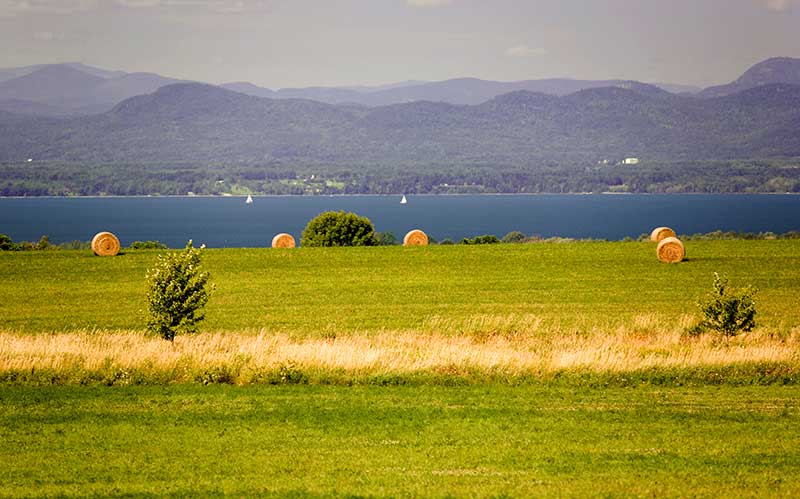
Lake Champlain and other waterways remain polluted with phosphorus and other nutrients, so legislators are looking at whether clean water laws are enforced strongly enough. Photo: JTyler/IStock
A summer of horrific blue-green algae outbreaks, particularly in Lake Carmi and along the shores of Lake Champlain, has many Vermont state legislators turning to the question of enforcement of our environmental laws. The fact is, we have protective laws on the books, but without enforcement, our water will remain polluted, threatening the health of people, wildlife, and our economy.
Recent discussions at the state house have centered on why Vermont’s rivers and lakes remain so polluted from nutrients, metals, invasive species, and other contaminants – despite increased investment in and regulation of cleanup efforts. One possible answer is the broken system of compliance with clean water requirements, including on our farms.
The Yin and Yang of Vermont’s Farm Economy
Vermont’s farmers play a critical role in our culture and our economy. Images of rolling farm fields and grazing dairy cows are as iconic to our state as our famous lake. Yet it can’t be denied that our farms are also major contributors to our water pollution issues.
Water runoff from farm fields is a particular problem, especially given the Environmental Protection Agency’s limits on phosphorus pollution that were set in 2016. Phosphorus is a direct cause of the toxic blue-green algae blooms plaguing our waterways – and one of its major sources is fertilizer running off of fields and feed supplements imported into Vermont.
While current regulations apply to farms – and more stringent requirements are in the works – they not always enforced.
Two Bills that Impact Enforcement on Farms Under Consideration
The Senate Committee on Agriculture is considering two bills that impact enforcement on farms. The first bill, S. 255, bars the Agency of Agriculture, Food, and Markets from investigating anonymous complaints of violations on farms unless they are accompanied by “specific, credible information.”
The clear intention is to curtail Vermonters’ ability to participate in the enforcement process. This would be a step backward at a time when we need to do more to clean up our lakes and rivers. CLF is opposed to this language and will fight against S. 255 this session.
The second bill, S. 220, proposes to transfer authority to enforce clean water requirements on farms from the Agency of Agriculture, Food, and Markets to the Agency of Natural Resources. The impetus to cleave enforcement responsibilities from Agriculture, Food, and Markets stems, in part, from a recent report by the Government Accountability Committee, which warns against a single agency both promoting and regulating a program.
Currently, Agriculture, Food, and Markets houses a division for farm business development and marketing as well as a division dedicated to regulating farms and enforcement. The question is whether it is a conflict of interest for the Secretary of Agriculture to oversee both divisions.
I am working with the Senate Committee on Agriculture to take up this issue and explore how the Agency investigates and addresses water quality violations on farms. Given the importance of reducing phosphorus pollution from farms, it is essential the public has faith in the Agency’s enforcement program.
Your Help Will Be Critical
This is a crucial year for clean water enforcement in Vermont and CLF will continue to work with our legislators to ensure that protections are strengthened, not weakened. We’ll be looking to you for help in the months to come. The more voices we can rally for clean water in Vermont, the sooner we can celebrate our waterways on the mend.



